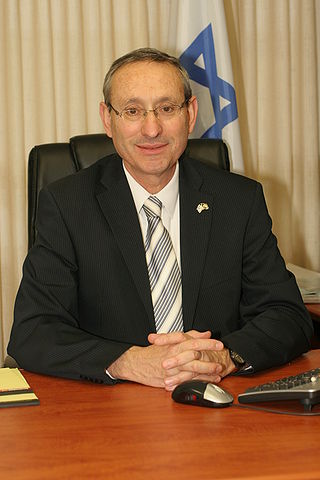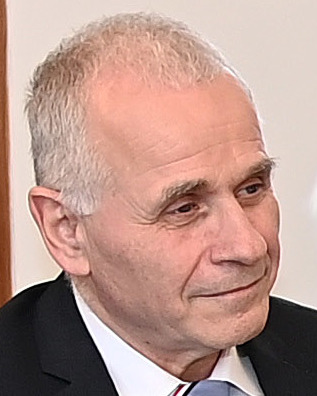
Moses ben Maimon (1138–1204), commonly known as Maimonides and also referred to by the acronym Rambam, was a Sephardic Jewish philosopher who became one of the most prolific and influential Torah scholars of the Middle Ages. In his time, he was also a preeminent astronomer and physician, serving as the personal physician of Saladin. Born in Córdoba within the Almoravid Empire, on Passover eve, 1138, he worked as a rabbi, physician and philosopher in Morocco and Egypt. He died in Egypt on 12 December 1204, his body was transported to the lower Galilee and was eventually buried in Tiberias.

Jewish philosophy includes all philosophy carried out by Jews, or in relation to the religion of Judaism. Until modern Haskalah and Jewish emancipation, Jewish philosophy was preoccupied with attempts to reconcile coherent new ideas into the tradition of Rabbinic Judaism, thus organizing emergent ideas that are not necessarily Jewish into a uniquely Jewish scholastic framework and world-view. With their acceptance into modern society, Jews with secular educations embraced or developed entirely new philosophies to meet the demands of the world in which they now found themselves.

The Hebrew University of Jerusalem is a public research university based in Jerusalem, Israel. Co-founded by Albert Einstein and Chaim Weizmann in July 1918, the public university officially opened in April 1925. It is the second-oldest Israeli university, having been founded 30 years before the establishment of the State of Israel but six years after the older Technion university. The HUJI has three campuses in Jerusalem and one in Rehovot. The world's largest library for Jewish studies—the National Library of Israel—is located on its Edmond J. Safra campus in the Givat Ram neighbourhood of Jerusalem.

Abraham Fraenkel was a German-born Israeli mathematician. He was an early Zionist and the first Dean of Mathematics at the Hebrew University of Jerusalem. He is known for his contributions to axiomatic set theory, especially his additions to Ernst Zermelo's axioms, which resulted in the Zermelo–Fraenkel set theory.

The Aleppo Codex is a medieval bound manuscript of the Hebrew Bible. The codex was written in the city of Tiberias in the tenth century CE under the rule of the Abbasid Caliphate, and was endorsed for its accuracy by Maimonides. Together with the Leningrad Codex, it contains the Ben-Asher masoretic tradition.

Benjamin Mazar was a pioneering Israeli historian, recognized as the "dean" of biblical archaeologists. He shared the national passion for the archaeology of Israel that also attracts considerable international interest due to the region's biblical links. He is known for his excavations at the most significant biblical site in Israel: south and south west of the Temple Mount in Jerusalem. In 1932 he conducted the first archaeological excavation under Jewish auspices in Israel at Beit She'arim and in 1948 was the first archaeologist to receive a permit granted by the new State of Israel. Mazar was trained as an Assyriologist and was an expert on biblical history, authoring more than 100 publications on the subject. He developed the field of historical geography of Israel. For decades he served as the chairman of the Israel Exploration Society and of the Archaeological Council of Israel. Between 1951 and 1977, Mazar served as Professor of Biblical History and Archaeology at the Hebrew University of Jerusalem. In 1952 he became Rector of the university and later its president for eight years commencing in 1953.

Rachel Elior is an Israeli professor of Jewish philosophy at the Hebrew University of Jerusalem in Jerusalem, Israel. Her principal subjects of research has been Hasidism and the history of early Jewish mysticism.

Menahem Ben-Sasson is an Israeli politician and a former member of the Knesset for Kadima. Between 2009 and 2017 he was the president of Hebrew University of Jerusalem, succeeding Menachem Magidor.

Tuvia Friling is an Emeritus professor at Ben-Gurion University of the Negev, Israel. Previously he served as a senior researcher at the Ben-Gurion Research Institute for the Study of Israel and Zionism and a lecturer at the Israel Studies Program both at Ben-Gurion University of the Negev.

Guy Gedalyah Stroumsa is an Israeli scholar of religion. He is Martin Buber Professor Emeritus of Comparative Religion at the Hebrew University of Jerusalem and Emeritus Professor of the Study of the Abrahamic Religions at the University of Oxford, where he is an Emeritus Fellow of Lady Margaret Hall. He is a Member of the Israel Academy of Sciences and Humanities.
The Tunisian city of Kairouan, also known as Kirwan or al-Qayrawan was a world center of Talmudic and Halakhic scholarship for at least three generations.
Muhammad ibn Sa'id al-Tamimi, , known by his kunya, "Abu Abdullah," but more commonly as Al-Tamimi, was a tenth-century physician, who came to renown on account of his medical works. Born in Jerusalem, Al-Tamimi spent his early years in and around Jerusalem where he studied medicine under the tutelage of two local physicians, Al-Hasan ibn Abi Nu'aym, and a Christian monk, Anba Zecharia ben Thawabah. Al-Tamimi possessed an uncommon knowledge of plants and their properties, such that his service in this field was highly coveted and brought him to serve as the personal physician of the Ikhshidid Governor of Ramla, al-Hassan bin Abdullah bin Tughj al-Mastouli, before being asked to render his services in Old Cairo, Egypt. Around 970, Al-Tamimi had settled in Old Cairo, Egypt, and there prospered in his medical field, writing a medical work for the vizier, Ya'qub ibn Killis (930–991), a Baghdadi Jew who came to work in Egypt under the auspices of the Fatimids. He specialized in compounding simple drugs and medicines, but is especially known for his having concocted a theriac reputed as a proven antidote in snakebite and other poisons, which he named tiryaq al-fārūq because of its exceptional qualities.

Daniel Judah Lasker is an American-born Israeli scholar of Jewish philosophy. As of 2017, he is Professor Emeritus in the Department of Jewish thought at Ben Gurion University of the Negev.

Amnon Pazy, אמנון פזי was an Israeli mathematician who specialized in partial differential equations (PDE), making important contributions to the PDE field and Semigroups. He served as president of the Hebrew University of Jerusalem and was the chairman of the Planning and Budgeting Committee of the Council for Higher Education in Israel. He also had a brief appearance as a background character in “Friends,” season 9.

Asher Cohen is an Israeli psychologist. He has been the 14th President of the Hebrew University of Jerusalem since September 1, 2017, and holds the university's Samuel Sturman Chair in Psychology.

Yosef Yoel Rivlin was an Israeli Oriental studies scholar, a professor at the Hebrew University of Jerusalem and a member of the Academy of the Hebrew Language.

Hanoch Gutfreund is the Andre Aisenstadt Chair in theoretical physics and was the president at the Hebrew University of Jerusalem. Prior to his presidency, he was a professor at the university.
Yoram Ben-Porat was an Israeli academic and economist. He served as president of the Hebrew University of Jerusalem from 1990 until his death in 1992 in an automobile accident at the age of 55.
Shmuel ben Ali ha-Levi was the most noteworthy of the twelfth-century Babylonian scholars and the only one of his era whose written works have survived in any significant number.

Hava Lazarus–Yafeh was a German-born Israeli Orientalist, scholar, editor, and educator. She known for her work in medieval and modern Islamic Studies and interfaith relations. Lazarus–Yafeh was a professor and a head of the Department for Islamic Civilization at the Hebrew University of Jerusalem. She won the Israel Prize in history in 1993.
















